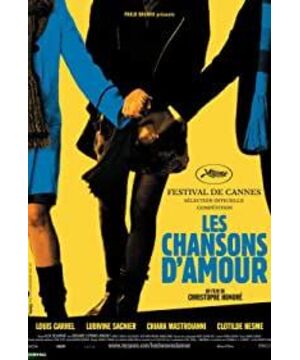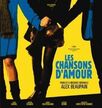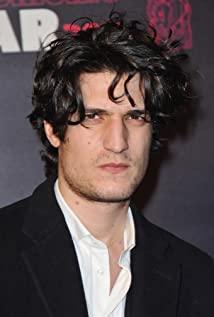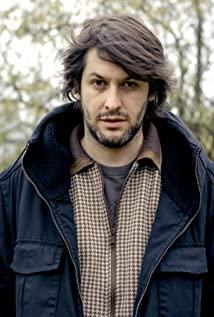For a musical movie, the quality of the music is the key to its success, so Alex Biopont became the deciding factor for the entire movie. For the composer who became an old friend at the age of 20, Honoré gave him full trust and high hopes. In order to avoid the vulgarity of the usual music, after many discussions, the two decided to use thirteen songs to connect the entire film, some from his latest album and some old ones (Biopon is not only dedicated to film music soundtracks). , also released several popular records such as Who Killed Bambi).
The film is very similar to the style of Demi's film. On the one hand, it is extremely pleasing to the eye, and on the other hand, it makes the audience feel lingering melancholy. With the trilogy of leaving, absence, and returning, it exhausts the emotions in modern society. sensitivity and complexity. At the beginning of the film, Julie (played by model-turned-Ludewyn Seigner) walked towards us along the charming streets of Paris in the night, watching the loneliness of the night movie alone, acting coquettishly to her boyfriend but not getting it. The coquettish and lonely appearance made this blond woman extremely beautiful and sad. After the movie ended, the boyfriend unexpectedly appeared, the naughty and cheerful music sounded, and the two flirted with singing. However, just when we thought they were going to spend a good deal of time together, an intruder broke the balance. It turns out that in order to keep the love fresh, Julie invited Alice, who had an affair with Ismail, to play a three-player game. But in the world of love, three people are always too crowded, and the selfish nature of love and the narrow gap between lovers are far from accommodating redundant people. Jolie's outbursts at family reunions are a good example of her sacrifice and unwillingness to love. Just as the continuous rain outside the window wetted the wings of the angels in the Place de la Bastille, it also drowned out Julie's yearning and confidence in love, so she suddenly left amid the unresolved contradictions. The first part of the film ends in this rainy day mixed with cold and ambiguous atmosphere. The sometimes naughty and sometimes sentimental melody is like a five-flavored love song, which makes people truly appreciate the ups and downs of love. Neutrogena performed well in the film with her beautiful image, and we can also see her in Honoré's later musical film [The Beloved].
The amorous and sadly handsome face in the film is all too familiar, but Louis Garrel almost misses the role. According to Honoré, he wanted to find a real singer to play Ismail, and even considered Vincent Delam, who was notorious at the time, but after Garrel pushed hard (such as recording his own singing) To Honoré), the director finally turned back to the actor he knew and loved so much. Of course, it turned out that his choice was not wrong, and Luiz's performance was as good as ever. Through this episode, Honoré is more aware of his positioning and needs. In the second part, Ismail, who has lost his beloved, wanders on the streets of Paris. In a trance, he seems to see Julie's beautiful figure, but he loses it in an instant. Most people who have lost their love have had this experience. After staying together for a long time, they are used to it and get bored, but when they lose it, they realize that she has been deeply imprinted in their hearts, such as a cinnabar mole that has long been integrated into one body. pain. At this time, Paris was like an empty city, filled with the breath of the dead, the low and sad piano sound slowly floated, and the whole city was listening to a lonely and sad song of nostalgia.
The final chapter love returns. Aiwan, the little Zhengtai, was deeply attracted by the mysterious sadness and loneliness of Ismail, and followed and chased, but was cruelly rejected. But like most ordinary people in the world, they just want a warm hug, they just don't want to suffer from loneliness all the time. After a few rounds, Ismail was still moved by Aiwan's sincere love and washed his muddy stream. Muddy memories in. Accompanied by the brisk melody of the guitar, the two embraced and kissed outside the window. Love is always a necessity in people's lives, and loneliness is an invincible enemy, so people always fall into love easily. As Ismail sang: "Love me less, but love me longer".
Under Honoré's precise command, this huge little Parisian love song ended in a warm rebirth. Life always has to experience pain and parting, but living and loving seems to be our only and best choice. Honoré, who tried musical language for the first time, avoided the abruptness of the lines and perfectly integrated them into the plot. The real framing in the 10th arrondissement of Paris also dissipated the alienation and unreality brought by the musical film to the audience. As a love song composed for love, it is undoubtedly touching. Biopon won the 33rd César Award for Best Score, and Honoré was nominated for the Palme d'Or at the 60th Cannes Film Festival. So far, after composing love, Honoré began to praise and reminisce about youth, and launched the youth love movie [Beautiful People] a year later, and boldly used Lea Seydoux, who was a newcomer in fashion.
Originally published in "Watching Movies" Weekly, please make a statement for reprinting, thank you.
View more about Love Songs reviews











